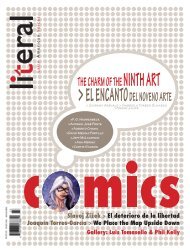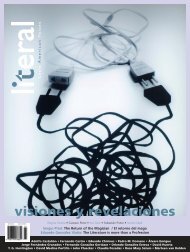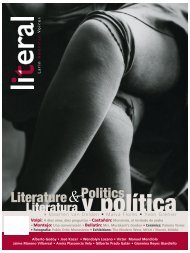Primo Jim Tanya Huntington Hyde - Literal
Primo Jim Tanya Huntington Hyde - Literal
Primo Jim Tanya Huntington Hyde - Literal
Create successful ePaper yourself
Turn your PDF publications into a flip-book with our unique Google optimized e-Paper software.
Geography is<br />
much deeper<br />
than History<br />
—it is there<br />
where you can<br />
fi nd the richest<br />
archetypal<br />
images. You<br />
should look<br />
for the animal<br />
soul that is<br />
rooted in<br />
nature.<br />
GB: Do you think there should be a dialogue between<br />
Latin American psychology and American or European<br />
Psychology?<br />
JH: Probably, but before any possibility of dialogue,<br />
there has to be a Latin American version of psychotherapy.<br />
GB: When you say “Latin American version of psychotherapy,”<br />
do you mean that Latin America has to<br />
generate its own style of psychotherapy?<br />
JH: Exactly, you have to build a Latin American way<br />
of doing therapy—one that has its own methods. It is<br />
true that there is a lot of diversity within Latin America,<br />
and that the mythologies and stories vary from country<br />
to country. However, there are several common factors<br />
shared by most. The colonizing period, for example, was<br />
experienced by almost the whole region—be it under<br />
the Spaniards or under the Portuguese. One common<br />
trait of Latin America is that it has been constantly under<br />
economic, political, and social oppression; fi rst by<br />
the conquistadores, then by the Catholic Church, now<br />
by American Corporations. This is precisely why it is important<br />
for Latin American psychotherapists to develop<br />
their own methods, and not adopt other styles, that<br />
would bring you back to the colonizing myth.<br />
One of the greatest problems in Latin America is<br />
this obsession with its historical oppression. This history<br />
is important, but the obsessive attachment to it can become<br />
an obstacle. This is like the problem of keeping<br />
psychotherapy within the consulting room, and trapped<br />
in the Cartesian vision—this kind of obsessions are very<br />
dangerous. If a new version of psychology is to be born,<br />
there has to be a shift that leads away from this obsession.<br />
Instead of history, you have to turn your focus into<br />
geography.<br />
GB: What do you mean turning our eyes into geography?<br />
JH: I mean turning the attention into land and landscape:<br />
into mountains, rivers, forests, deserts, jungles.<br />
Again: place and aesthetic sense. Geography is much<br />
deeper than History—it is there where you can fi nd the<br />
richest archetypal images. You should look for the animal<br />
soul that is rooted in nature. This is a good way of<br />
fi nding a style of psychology that fi ts the culture.<br />
GB: But how is it possible to simply look away from<br />
hundreds of years of history?<br />
JH: Of course you should not look away from history.<br />
I am not suggesting to look away from it, but to<br />
look below it. Look into geography and into the land,<br />
it is there where you can fi nd the images that will lead<br />
you to an original version of psychotherapy that will be<br />
congruent with Latin American Culture.<br />
32 4 LITERAL. LATIN AMERICAN VOICES FALL, 2008<br />
tura. Algunas personas ya han hecho labor en este respecto<br />
—el trabajo de Paul Freire en Brasil es un buen ejemplo.<br />
GB: ¿Cree que debería existir un diálogo entre la psicología<br />
latinoamericana y la psicología estadounidense o<br />
europea?<br />
JH: Probablemente, pero antes de cualquier diálogo,<br />
debe haber una versión latinoamericana de psicoterapia.<br />
GB: Cuando habla de una “versión latinoamericana de<br />
psicoterapia”, ¿quiere decir que Latinoamérica debe generar<br />
un estilo determinado de hacer terapia?<br />
JH: Exactamente, hay que construir un modo latinoamericano<br />
de hacer terapia —uno que posea sus propios<br />
métodos. Aunque es verdad que dentro de América Latina<br />
hay gran diversidad, y que cada país tiene su propia mitología<br />
y sus propias historias, también lo es que hay factores<br />
comunes casi a toda la región. Los tiempos de la colonización,<br />
por ejemplo, fueron experimentados por la mayoría;<br />
ya sea en manos de los españoles o de los portugueses. Una<br />
de las características principales de América Latina es que ha<br />
estado bajo una constante opresión económica, política y<br />
social; primero por los conquistadores europeos, luego por<br />
la iglesia católica, y ahora por las corporaciones norteamericanas.<br />
Por esto es tan importante que los latinoamericanos<br />
desarrollen sus propios métodos y eviten adoptar estilos ajenos<br />
que sólo los regresarían al mito de la Colonia.<br />
Uno de los grandes problemas de América Latina es<br />
la obsesión con esta opresión histórica. Esta historia es importante,<br />
pero el apego obsesivo puede convertirse en un<br />
obstáculo. Es igual que lo que mencionaba sobre la problemática<br />
de mantener la psicoterapia dentro del consultorio y<br />
encerrada en la visión cartesiana —ese tipo de obsesiones<br />
son muy peligrosas. Si una nueva versión de psicología ha<br />
de nacer, debe haber un viraje que apunte lejos de esta obsesión<br />
—hay que dejar de concentrarse en la historia y mirar<br />
hacia la geografía.<br />
GB: ¿A qué se refi ere con mirar hacia la geografía?<br />
JH: Quiero decir que hay que poner la atención en la<br />
tierra y el paisaje: en los ríos, las montañas, los bosques,<br />
los desiertos, las selvas. De nuevo: la noción de lugar y el<br />
sentido estético. La geografía es mucho más profunda que<br />
la historia, es ahí en donde encontrarán las imágenes arquetípicas<br />
de mayor riqueza. Deben buscar el alma animal que<br />
está enraizada en la naturaleza. Este es un buen método<br />
para encontrar un estilo de psicoterapia que vaya de acuerdo<br />
con la cultura del lugar.<br />
GB: ¿Pero cómo es posible apartar la vista de cientos<br />
de años de historia?<br />
JH: Por supuesto que no hay que apartar la vista de<br />
la historia, lo que yo sugiero es que se debe mirar debajo<br />
de ella. Hay que dirigir la vista hacia su geografía, hacia su<br />
tierra, es ahí donde encontrarán las imágenes que los llevarán<br />
a una versión original de psicoterapia, una que sea<br />
congruente con la cultura latinoamericana.






